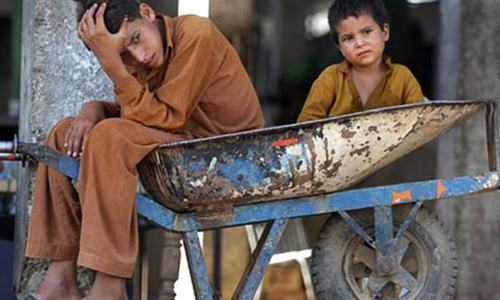
The hari-landlord relationship remains undocumented in Sindh. This makes peasants vulnerable to all forms of exploitation.
Weaker laws and regulatory framework deprive haris of legal protection. In many cases, they survive in subhuman conditions and fall prey to slavery.
Sindh Tenancy Act (STA) 1950 seeks to protect their rights, thanks to a relentless struggle by one of the greatest hari leaders of his era, Hyder Bux Jatoi. However, haris can hardly invoke its provisions to get their rights.
You might want to read: Addressing Pakistan’s modern slavery problem
Yet this law, which describes a hari as a tenant, was amended by the Sindh Assembly in 2013. The most damaging amendment that the PPP, which derives its electoral strength from rural Sindh, introduced to it was the omission of the following words: “But the landlord shall not take any free labour from the tenant or a member of his family against his will.”
In other words, legislators have legalised slavery.
According to veteran labour rights activist Karamat Ali, this amendment shows that legislators are in a state of denial as they believe landowners don’t take begaar (free labour). “Legislators from urban areas also voted for the amendment,” he said.
Landowners maintain accounts of expenditures that they settle with haris after the harvest. Haris till the land under no written agreement
Practically, the hari-landlord relationship is governed under no law. Haris are not registered under the record of rights as permanent tenants as per the 1950 law. Usually, peasants share expenses incurred by their landlords as the latter purchase all inputs either by themselves or through local financiers. These local lenders charge interest rates that are multiple times higher than the mark-up on a typical bank loan.
For instance, a local lender provides farmers with a urea bag at Rs2,400 on credit even though its actual price varies between Rs1,600 and Rs1,700. The loan is usually adjusted once the crop is harvested and sold either in the market or to the same lender.
This undermines the monetary interests of haris who have to make do with a meagre share in the profit after the deduction of expenses. Landowners maintain accounts of expenditures and settle the same with haris after the harvest. Haris till the land under no written agreement.
A landlord lets haris cultivate separate pieces of land. They depend on the landlord for meeting their day-to-day needs as he ensures the supply of irrigation water, seeds, fertiliser, pesticides and tractors.
Although the STA is considered a pro-peasant law, rights bodies have come up with some draft amendments to make it more progressive. However, the Sindh government hasn’t considered those amendments yet.
Many people believe that elected representatives in rural Sindh are primarily from powerful landed aristocracy and get support from their urban counterparts. Overall, 10 amendments have been made to the law. But there hasn’t been any meaningful impact as far as conditions of the haris are concerned.
The STA calls for setting up tribunals to resolve hari-landowner disputes. But no such body has been set up so far.
One draft amendment calls for placing the tribunals under the judicial magistrate instead of a taluka-level assistant commissioner as enshrined in actual STA.
Another draft amendment calls for making a tribunal’s decision challengeable in “higher civil courts” contrary to the actual provision that says, “A decision of tribunal or in appeal by collector (deputy commissioner) and then by commissioner shall be final and shall not be called in question in any court.” But these amendments have not been considered.
Interestingly, farm workers and those working in the fisheries sector are now covered by the definition of “industrial labour” under Sindh Industrial Relations Act (SIRA) 2013. But the rules under the SIRA have not been issued yet.
Sindh Abadgar Board Vice President Mahmood Nawaz Shah says relevant departments lack the capacity to implement tenancy rules. Laws like the STA couldn’t take effect under a weak governance structure.
Mr Ali says conditions for farm labour are extremely poor. “They have no right to form a union. When a hari is not registered with the revenue department, he and his family can be evicted by the landowner any time,” he says.
Any payment of advances to haris is prohibited under Bonded Labour System (Abolition) Act 2015
An identical situation exists even in the formal labour sector where third-party employment by factory owners is commonplace now, he adds.
The cases of bonded labourers are usually reported against the backdrop of the poor implementation of tenancy laws. Such haris escape from the clutches of landowners to avoid paying the debt they obtained in advance. Any payment of advances to haris under Bonded Labour System (Abolition) Act 2015 is prohibited. But the law is rarely implemented.
Peasant rights activists claim that 13.46 million people were employed in Sindh in 2012. Of them, as many as 7.74m were based in rural areas. A majority of them work as sharecroppers — landless tenants or peasants — as well as wage labour.
Trade unionist Nasir Mansoor asserts that even the STA has become obsolete now. He believes that only getting haris freed from bondage is no solution to the issue. An entirely new consultation is needed to look at the hari-landlord relationship, he stated, adding that peasants will continue ending up as losers otherwise.
Published in Dawn, The Business and Finance Weekly, October 1st, 2018













































